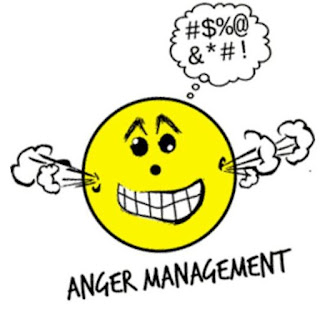- Raymond Novaco (1975)
- Suggests cognitive factors trigger emotional arousal which leads to aggressive acts.
- In behaviourist terms becoming angry is reinforced by the individuals feeling of control in that situation. As such, anger management programmes are a form of CBT – the individual is taught how to recognize when they are losing control, and then encouraged to develop techniques which bring about conflict-resolution without the need for violence.
- Anger Management – a form of CBT, individual is taught to realise when they are losing control and encouraged to
 develop techniques which bring about conflict-resolution.
develop techniques which bring about conflict-resolution. - 3 Stages
- Cognitive Preparation – reflect on past experience and consider typical patterns in anger, learns to identify triggers, and classify them as irrational.
- Skill Acquisition – techniques and skills to help them deal with anger-inducing situations.
- COGNITIVE – positive self-talk to encourage calmness
- BEHAVIOURAL – assertiveness training to communicate more effectively
- PHYSIOLOGICAL – methods of relaxation
- Application Practice – role play to re-enact scenarios that may have escalated anger in the past.
| Supporting Evidence – Julia Keen et al (2000) – studied progress made with young offenders aged 17-21 under nationally recognised anger management programme, 8 2-hour sessions (7 over 3 weeks and 1 a month afterwards), final outcomes generally positive and greater awareness of anger management difficulties / capacity to exercise self-control, despite offenders not taking it seriously at first – is effective at helping to control anger in offenders, could be implemented on a national scale.
Supporting Evidence – Jane Ireland (2004) – compared two groups of offenders in anger management programmer and non-treatment control/’waiting list’, assessed using self-report, checklist by prison officers and observation, 92% showed improvement in at least one measure, 48% in checklist and self-report, no improvements among control group – conveys improvement in managing anger as a result of programme in offenders. Holistic – cognitive, behavioural and social approaches – multidisciplinary approach may mean more effective treatment as it would deal with a range of factors |
Limited Long-Term Effectiveness – Ronald Blackburn (1993) – did follow up studies and found little evidence that it reduces recidivism in the long-term, role play is artificial and may have limited representation to real-life situations – progress may not actually reduce recidivism.
Anger and Offending Might Only Be Associated – Wagdy Loza and Amel Loza-Fanous (1999) – range of psychometric measures and found no differences in levels of anger between violent and non-violent offenders – might not be anger that motivates violent crime. Difficult to Implement – require highly trained specialists, prisons may not have resources to fund it, requires commitment – may not be useful if prisons are lacking, or prisoners refuse to co-operate. |
